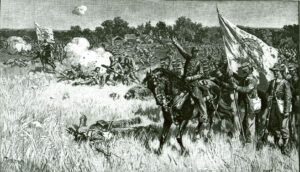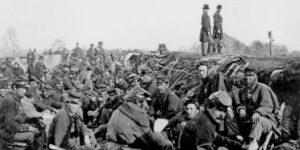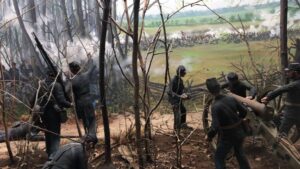What it is like living during the Civil War for a black person
Today’s date is May 15, 1863
We have been fighting the American Civil war for two years now. I have seen so many people die right in front of my eyes. I lost people that I know. There are a lot of protests and tensions around here. Some states are protesting because they want slavery and some are protesting because they believe in the individual rights and freedoms that are mentioned in the Declaration of Independence. Racism is at its worst. Some people are blaming black people for wanting their freedom and saying that we are bringing the destruction of this country. What can we expect from these people? The man that wrote the Declaration of Independence, owned slaves himself but he talked about Life and Liberty in it. There are so many people dying and so many things happening around us that sometimes I wonder, why are we fighting this war? What is in it for us?
I have spent the last 50 years of my life being a slave. I was born into slavery. I don’t have any memory of my parents because I was separated from them when I was very young. The family I grew up with gave me a basic education and I used to work for them in a cotton field. My master had a total of 14 slaves and one of them was my wife. After working for him for years, our master decided that he didn’t need slaves anymore and he sold us to different families. I got separated from my family when I was 30. I was sold to a family who lives in South Carolina where I was treated really badly and they dehumanized me so much that sometimes I wanted to run away. But I always kept that thought buried inside me. I don’t have any idea how my wife and my kids are doing. I think about how different my life might have been if I didn’t get separated from my family and if slavery did not exist? According to Asante, “What natural responses would occur in the relationships, attitudes toward the environment, kinship patterns, preferences for colors, type of religion, and historical referent points for African people if there had not been any intervention of colonialism or enslavement?” (9). Our life would be so different if slavery never happened. I would have seen my kids grow up who were 5 and 7 at that time. So what is the point of fighting this war? What’s in it for us? I have already lost so much.
I think we are fighting for our freedom and our rights because we want to build a better America for our future generations. We want to build an America where our future generations don’t have to get separated from their families just like I got separated from my family. Where they will not be sold as a product. Where people will see us as humans and not as animals. Where people will realize that we have the right to do everything that a white man can do. In What Black Man Wants, Frederick Douglass said, “We want it because it is our right, first of all. No class of men can, without insulting their own nature, be content with any deprivation of their rights. We want it again, as a means for educating race” (124). Douglass gave us a clear explanation of why we want our freedom from whites. The United States is a free land, therefore, why should we be controlled by those who dehumanize us? Blacks should be free in this land as well. Our descendants should have access to education and have the right to vote. They should be considered citizens of the United States. This is our country as well. Our ancestors have been living in this country since 1619. We have been here for a very long time, yet we can’t consider this land to be our country as it does not give us the right to. We want to build an America where we get to do all the things I mentioned, we don’t want to settle for anything less but more.
Here are some pictures that were posted in the newspaper.



Work Cited
Marable, Manning, and Leith Mullings. Let Nobody Turn Us Around: Voices of Resistance, Reform, and Renewal: An African American Anthology. Rowman & Littlefield, 2009.
Asante, Molefi K. Afrocentricity, Dr. Molefi K Asante, 13 Mar. 2009, http://www.asante.net/articles/1/afrocentricity/
Thure, Thulstrap. “Rallying the Troops of Bee, Bartow, and Evans, Behind the Robinson House.” https://www.nps.gov/mana/learn/historyculture/first-manassas.htm
Blackburn, Alexander. “Alexander, Blackburn: New act expands Shiloh Battlefield.” 2019.
https://wreg.com/news/alexander-blackburn-new-act-expands-shiloh-battlefield/
Library of Congress. “On this day: The epic Civil War Battle of Chancellorsville began near modern-day Fredericksburg.” https://www.nbc12.com/2020/04/27/this-day-battle-chancellorsville/




Hi.
1)Overall impression
When I first started reading the work, it made me feel emotional because it shows the lies and hypocrisy of the Declaration of Independence. It shows that African Americans are still fighting for their rights after hundreds of years have passed. The first thing I noticed was her talking about an African American experience in the civil war. After seeing this, the most important thing is always to remember that the Declaration of Independence was not made for every American but only for white Americans.
2) Content
This project does contain a theatrical reading (Afrocentricity) and a Primary Source from the Anthology ( In What Black Man Wants, Frederick Douglass )and additional research on Frederick Douglass. The explanation of how they connect was a little bit confusing. The connection between the texts did make the project very interesting to read through. Also, There was five work cited.
3) Creativity
I think this project shows a high level of creativity when she uses told a story from an African American perspective. It made it powerful and showed you the experience of an African American in the civil war. The most exciting thing about this project is what African Americans were thinking during the time. For example, when she stated, “We want to build an America where our future generations don’t have to get separated from their families just like I got separated from my family,” this shows enslaved Africans just wanted to live everyday life without any suffering.
4) Formatting
I would rate this project design and layout a three because it doesn’t show an exciting structure. The genre it has is the visual of Photos, and the format is appropriate. I would rate their use of color and images a four because she used interesting photos that connect to her theory.
5) Grows + Glows
This project’s two glows are the photos and the interesting way she connected all texts. Two ways this project could grow is to make a better layout and maybe explain the photos
1- Overall impression: I felt like you did an awesome job in describing the details of how someone must have definitely felt during this time period, a feeling that none of us would really be able to experience today. Definitely being the first thing I noticed. It’s very impressive that you were able to encapsulate that feeling. Reading this will definitely give me a new perspective when reading upon slavery, especially during the civil war.
2-Content: This uses the right amount of research, in using all three different types of sources. I enjoyed seeing and reading about how they all connect, and didn’t serve to confuse me at all.
3-Creativity: This project would definitely need a high amount of creativity to even get done in the first place, being told from a perspective other than her own. It’s definitely cool learning, and thinking about this perspective that some have probably never thought about, and seeing it in action.
4: Formatting: I would rate the layout a 5/5. I love how simple, and straight to the point it is. The inclusion of pictures also help it pop in general.
5: Grows/Glows: To grow, perhaps add me more detail if needed. A glow would definitely be the way you spoke, and described this complex perspective from an African American slave.